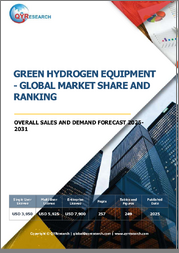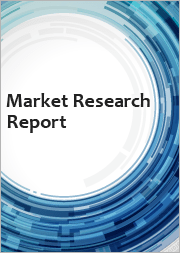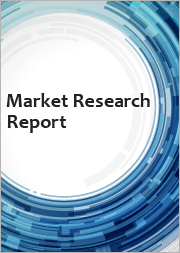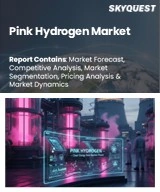
|
시장보고서
상품코드
1701652
수소 시장 : 세계 산업 분석, 규모, 점유율, 성장, 동향, 예측(2025-2032년)Hydrogen Market: Global Industry Analysis, Size, Share, Growth, Trends, and Forecast, 2025 - 2032 |
||||||
주요 조사 결과
- 수소 시장 규모 : 2,347억 달러(2025년)
- 예상 시장 규모 : 3,997억 달러(2032년)
- 세계 시장 성장률 : 7.9%(2025-2032년 CAGR)
수소 시장 - 보고서 범위
수소는 청정에너지 솔루션으로의 전환에 중요한 역할을 하고 있으며, 연료전지, 산업 공정 및 운송의 중요한 구성요소로 자리 잡고 있습니다. 수소는 석유 정제, 암모니아 생산, 제철, 수소 자동차 및 재생에너지 저장의 새로운 용도 등 다양한 산업에서 활용되고 있습니다. 수소 시장은 생산 방식에 따라 회색 수소(화석연료에서 생산), 블루 수소(탄소 회수 기술을 이용한 생산), 그린 수소(재생에너지를 이용한 생산) 등으로 구분됩니다. 시장 성장의 원동력은 수소 기반 에너지 솔루션에 대한 정부 지원 증가, 수소 생산 기술 발전, 이산화탄소 배출량 감축을 위한 청정 대체 에너지에 대한 수요 증가입니다.
시장 성장 촉진요인
세계 수소 시장은 탈탄소화와 청정에너지 전환에 대한 관심 증가 등 여러 요인에 의해 주도되고 있습니다. 각국 정부는 수소 인프라에 투자하고 친환경 수소 도입을 촉진하는 정책을 수립하고 있습니다. 수소 연료전지 차량, 버스, 기차 등 운송 부문에서 수소 연료전지에 대한 수요 증가는 시장 확대를 촉진하는 요인으로 작용하고 있습니다. 전기분해와 탄소회수 기술의 발전으로 수소 생산의 효율성과 비용 효율성이 높아지고 있습니다. 또한, 화학 생산 및 발전과 같은 산업 응용 분야에서 수소의 통합이 진행되면서 시장 성장을 촉진하고 있습니다.
시장 억제요인
유망한 성장 전망에도 불구하고 수소 시장은 높은 생산 비용, 저장의 복잡성, 인프라의 한계와 관련된 도전에 직면해 있습니다. 친환경 수소 생산은 전해조와 재생에너지 원의 높은 비용으로 인해 여전히 비용이 많이 듭니다. 수소의 저장 및 운송에는 특수한 인프라가 필요하며, 이는 물류 및 재정적 문제를 야기합니다. 또한, 수소 자동차를 위한 연료 충전소의 보급이 미비한 것도 운송 부문에서의 대규모 채택을 가로막고 있습니다. 이러한 문제를 해결하기 위해서는 수소 인프라에 대한 지속적인 투자, 연구 개발, 정부 인센티브가 필요하며, 수소를 기존 연료에 대한 실행 가능한 대체 연료로 만들어야 합니다.
시장 기회
수소 시장에는 진행 중인 연구 개발, 정부 이니셔티브, 민간 부문의 투자로 인해 큰 기회가 있습니다. 상업용 차량, 선박, 항공 등 수소 기반 운송의 확대는 새로운 성장의 길을 열어줄 것입니다. 대규모 수소 저장 솔루션의 개발과 주거 및 산업용 애플리케이션에서 천연가스와 수소를 혼합하는 것은 시장의 잠재력을 더욱 높여줄 것입니다. 정부, 에너지 기업, 기술 제공업체들이 수소 허브와 공급망을 구축하기 위해 협력하는 움직임이 활발해지고 있는 것도 수소 시장의 성장을 가속화하는 데 중요한 역할을 할 것입니다.
이 보고서는 세계 수소 시장에 대해 조사하고, 성장 촉진요인, 동향, 기회, 과제 등 시장 역학에 대한 상세한 분석을 제공합니다.
목차
제1장 주요 요약
제2장 시장 개요
- 시장 범위/분류
- 시장 정의/범위/제한
제3장 주요 시장 동향
- 시장에 영향을 미치는 주요 동향
제4장 중요한 성공요인
- 전략적 프로모션 전략
제5장 세계 시장 수요 분석(2019-2032년)
- 시장 수량 실적 분석(2019-2024년)
- 현재와 향후 시장 수량 예측(2025-2032년)
- 전년비 성장 동향 분석
제6장 세계 시장 - 가격 분석
- 세계의 평균 가격 분석 벤치마크
제7장 세계 시장 수요 분석(2019-2032년)
- 시장 금액 실적 분석(2019-2024년)
- 현재와 향후 시장 금액 예측(2025-2032년)
- 전년비 성장 동향 분석
- 절대적 수익 기회 분석
제8장 시장 배경
- 거시경제 요인
- 예측요인 - 관련성과 영향
- 밸류체인
- 수급 분석
- 시장 역학
- COVID-19 위기의 영향
제9장 세계 시장 분석 : 생산 방법별(2019-2032년)
- 소개/주요 조사 결과
- 시장 규모와 수량 실적 분석 : 생산 방법별(2019-2024년)
- 현재와 향후 시장 규모와 수량 분석과 예측 : 생산 방법별(2025-2032년)
- 식품 수증기 메탄 개질
- 기름 부분 산화
- 석탄 가스화
- 전해
- 기타
제10장 세계 시장 분석 : 최종 용도별(2019-2032년)
- 소개/주요 조사 결과
- 시장 규모와 수량 실적 분석 : 최종 용도별(2019-2024년)
- 현재와 향후 시장 규모와 수량 분석과 예측 : 최종 용도별(2025-2032년)
- 발전
- 정유
- 금속 가공
- 자동차 연료
- 화학
- 유리 산업
- 식용 유지
- 기타
제11장 세계 시장 분석 : 배송 방식별(2019-2032년)
- 소개/주요 조사 결과
- 시장 규모와 수량 실적 분석 : 배송 방식별(2019-2024년)
- 현재와 향후 시장 규모와 수량 분석과 예측 : 배송 방식별(2025-2032년)
- 집중생산
- 분산 생산
제12장 세계 시장 분석 : 지역별(2019-2032년)
- 소개
- 시장 규모와 수량 실적 분석 : 지역별(2019-2024년)
- 현재 시장 규모와 수량 분석과 예측 : 지역별(2025-2032년)
- 북미
- 라틴아메리카
- 유럽
- 남아시아 및 태평양
- 동아시아
- 중동 및 아프리카
제13장 북미 시장 분석(2019-2032년)
제14장 라틴아메리카 시장 분석(2019-2032년)
제15장 유럽 시장 분석(2019-2032년)
제16장 남아시아 및 태평양 시장 분석(2019-2032년)
제17장 동아시아 시장 분석(2019-2032년)
제18장 중동 및 아프리카 시장 분석(2019-2032년)
제19장 주요 국가/신흥 시장 분석
- 미국 시장 분석
- 생산 방법별
- 최종 용도별
- 배송 방식별
- 캐나다 시장 분석
- 생산 방법별
- 최종 용도별
- 배송 방식별
- 멕시코 시장 분석
- 생산 방법별
- 최종 용도별
- 배송 방식별
- 브라질 시장 분석
- 생산 방법별
- 최종 용도별
- 배송 방식별
- 독일 시장 분석
- 생산 방법별
- 최종 용도별
- 배송 방식별
- 이탈리아 시장 분석
- 생산 방법별
- 최종 용도별
- 배송 방식별
- 프랑스 시장 분석
- 생산 방법별
- 최종 용도별
- 배송 방식별
- 영국 시장 분석
- 생산 방법별
- 최종 용도별
- 배송 방식별
- 스페인 시장 분석
- 생산 방법별
- 최종 용도별
- 배송 방식별
- 러시아 시장 분석
- 생산 방법별
- 최종 용도별
- 배송 방식별
- 베네룩스 시장 분석
- 생산 방법별
- 최종 용도별
- 배송 방식별
- 중국 시장 분석
- 생산 방법별
- 최종 용도별
- 배송 방식별
- 일본 시장 분석
- 생산 방법별
- 최종 용도별
- 배송 방식별
- 한국 시장 분석
- 생산 방법별
- 최종 용도별
- 배송 방식별
- 인도 시장 분석
- 생산 방법별
- 최종 용도별
- 배송 방식별
- ASEAN 시장 분석
- 생산 방법별
- 최종 용도별
- 배송 방식별
- 호주·뉴질랜드 시장 분석
- 생산 방법별
- 최종 용도별
- 배송 방식별
- GCC 국가 시장 분석
- 생산 방법별
- 최종 용도별
- 배송 방식별
- 튀르키예 시장 분석
- 생산 방법별
- 최종 용도별
- 배송 방식별
- 북아프리카 시장 분석
- 생산 방법별
- 최종 용도별
- 배송 방식별
- 남아프리카공화국 시장 분석
- 생산 방법별
- 최종 용도별
- 배송 방식별
제20장 시장 구조 분석
- 시장 집중 : 주요 기업별
- 시장 분석 : 기업 Tier별
- 주요 기업의 시장 점유율 분석
- 시장 입지 분석
제21장 경쟁 분석
- 경쟁 대시보드
- 경쟁 상세
- The Linde Group
- Air Liquide SA
- Air Products and Chemicals, Inc.
- Iwatani Corporation
- Showa Denko KK
- Teledyne Technologies Inc.
- Messer Group GmbH
- Hydrogenics Corp.
- Nel ASA
- Southern Industrial Gas Sdn Bhd
- Hy.Gear BV
- Xebec Adsorption Inc.
- ALLY HI-TECH CO., LTD
- Ellenbarrie Industrial Gases Ltd
- CLAIND Srl
- Bristol Gases-Concorde Corodex Group
- Taiyo Nippon Sanso Corporation
- Yateem Oxygen
- Nuvera Fuel Cells, LLC
- Gulf Cryo Holding CSC
제22장 가정과 사용되는 두문자어
제23장 조사 방법
ksm 25.04.22Persistence Market Research has recently released a comprehensive report on the worldwide market for hydrogen. The report offers a thorough assessment of crucial market dynamics, including drivers, trends, opportunities, and challenges, providing detailed insights into the market structure. This research publication presents exclusive data and statistics outlining the anticipated growth trajectory of the global hydrogen market from 2025 to 2032.
Key Insights:
- Hydrogen Market Size (2025E): USD 234.7 Billion
- Projected Market Value (2032F): USD 399.7 Billion
- Global Market Growth Rate (CAGR 2025 to 2032): 7.9%
Hydrogen Market - Report Scope:
Hydrogen plays a crucial role in the transition towards clean energy solutions, serving as a key component in fuel cells, industrial processes, and transportation. It is widely used across industries such as oil refining, ammonia production, steel manufacturing, and emerging applications in hydrogen-powered vehicles and renewable energy storage. The hydrogen market is segmented based on production methods, including grey hydrogen (produced from fossil fuels), blue hydrogen (produced with carbon capture technology), and green hydrogen (produced using renewable energy). Market growth is driven by increasing government support for hydrogen-based energy solutions, advancements in hydrogen production technologies, and rising demand for clean energy alternatives to reduce carbon emissions.
Market Growth Drivers:
The global hydrogen market is propelled by several key factors, including the growing focus on decarbonization and clean energy transition. Governments worldwide are investing in hydrogen infrastructure and formulating policies to promote green hydrogen adoption. The rising demand for hydrogen fuel cells in transportation, including hydrogen-powered vehicles, buses, and trains, is driving market expansion. Technological advancements in electrolysis and carbon capture are making hydrogen production more efficient and cost-effective. Additionally, the increasing integration of hydrogen in industrial applications, such as chemical production and power generation, is fostering market growth.
Market Restraints:
Despite promising growth prospects, the hydrogen market faces challenges related to high production costs, storage complexities, and infrastructure limitations. The production of green hydrogen remains expensive due to the high cost of electrolyzers and renewable energy sources. Storage and transportation of hydrogen require specialized infrastructure, which poses logistical and financial challenges. Additionally, the lack of widespread refueling stations for hydrogen-powered vehicles hinders mass adoption in the transportation sector. Addressing these challenges requires continued investment in hydrogen infrastructure, research and development, and government incentives to make hydrogen a viable alternative to conventional fuels.
Market Opportunities:
The hydrogen market presents significant opportunities driven by ongoing research and development, government initiatives, and private sector investments. The expansion of hydrogen-powered transportation, including commercial fleets, maritime applications, and aviation, opens new growth avenues. The development of large-scale hydrogen storage solutions and hydrogen blending with natural gas for residential and industrial applications further enhances market potential. The increasing collaboration between governments, energy companies, and technology providers to establish hydrogen hubs and supply chains will play a crucial role in accelerating hydrogen market growth.
Key Questions Answered in the Report:
- What are the primary factors driving the growth of the hydrogen market globally?
- How are technological advancements influencing the production and adoption of hydrogen?
- What are the major challenges affecting the growth of the hydrogen market?
- Who are the key players in the hydrogen market, and what strategies are they employing to maintain market relevance?
- What are the emerging trends and future prospects in the global hydrogen market?
Competitive Intelligence and Business Strategy:
Leading players in the global hydrogen market, including Air Liquide, Linde plc, and Plug Power Inc., focus on innovation, strategic partnerships, and infrastructure development to strengthen their market position. These companies invest in R&D to enhance hydrogen production efficiency, develop advanced storage and transportation solutions, and expand their renewable hydrogen production capacity. Collaborations with government agencies and industrial partners facilitate the deployment of hydrogen-powered solutions in various sectors. Additionally, initiatives such as hydrogen refueling station expansion and large-scale electrolyzer deployment play a critical role in market expansion.
Key Companies Profiled
- The Linde Group
- Air Liquide S.A.
- Air Products and Chemicals, Inc.
- Iwatani Corporation
- Showa Denko K.K.
- Teledyne Technologies Inc.
- Messer Group GmbH
- Hydrogenics Corp.
- Nel ASA
- Southern Industrial Gas Sdn Bhd
- Hy.Gear B.V.
- Xebec Adsorption Inc.
- ALLY HI-TECH CO., LTD
- Ellenbarrie Industrial Gases Ltd
- CLAIND Srl
- Bristol Gases - Concorde Corodex Group
- Taiyo Nippon Sanso Corporation
- Yateem Oxygen
- Nuvera Fuel Cells, LLC
- Gulf Cryo Holding C.S.C
Hydrogen Industry Segmentation
By Production Method:
- Methane Reforming
- Oxidation of Oil
- Coal Gasification
- Electrolysis
- Others
By End Use:
- Power Generation
- Petroleum Refinery
- Metal Processing
- Automotive Fuel
- Chemical
- Ammonia
- Methanol
- Resin
- Polymer
- Glass Industry
- Edible Fats & Oils
- Others
By Delivery mode:
- Centralized Production
- Pipelines
- Trucks
- Cylinders
- Distributed Production
- Captive Storage
By Region:
- North America
- Latin America
- Europe
- East Asia
- South Asia & Pacific
- Middle East & Africa
Table of Contents
1. Executive Summary
- 1.1. Global Market Outlook
- 1.2. Demand Side Trends
- 1.3. Supply Side Trends
- 1.4. Technology Roadmap
- 1.5. Analysis and Recommendations
2. Market Overview
- 2.1. Market Coverage / Taxonomy
- 2.2. Market Definition / Scope / Limitations
3. Key Market Trends
- 3.1. Key Trends Impacting the Market
4. Key Success Factors
- 4.1. Strategic Promotional Strategies
5. Global Market Demand Analysis 2019-2032
- 5.1. Historical Market Volume (Thousand Tons) Analysis, 2019-2024
- 5.2. Current and Future Market Volume (Thousand Tons) Projections, 2025-2032
- 5.3. Y-o-Y Growth Trend Analysis
6. Global Market - Pricing Analysis
- 6.1. Global Average Pricing Analysis Benchmark
7. Global Market Demand (in Value or Size in US$ Thousand) Analysis 2019-2032
- 7.1. Historical Market Value (US$ Thousand) Analysis, 2019-2024
- 7.2. Current and Future Market Value (US$ Thousand) Projections, 2025-2032
- 7.2.1. Y-o-Y Growth Trend Analysis
- 7.2.2. Absolute $ Opportunity Analysis
8. Market Background
- 8.1. Macro-Economic Factors
- 8.1.1. Manufacturing Value Added by Key Countries
- 8.1.2. Global GDP Growth Outlook
- 8.1.3. Global Petroleum Refining Industry Overview
- 8.1.4. Global Fertilizer Industry Overview.
- 8.2. Forecast Factors - Relevance & Impact
- 8.2.1. GDP Growth
- 8.2.2. Ongoing Research & Development Activity
- 8.2.3. Growth in Transport Industry
- 8.2.4. Population Growth and Demographic Shifts
- 8.2.5. Substitute Fuels Analysis
- 8.2.6. COVID-19 Impact
- 8.3. Value Chain
- 8.4. Supply-Demand Analysis
- 8.5. Market Dynamics
- 8.5.1. Drivers
- 8.5.2. Restraints
- 8.5.3. Opportunity Analysis
- 8.6. Impact of COVID - 19 Crisis
9. Global Market Analysis 2019-2032, By Production Method
- 9.1. Introduction / Key Findings
- 9.2. Historical Market Size (US$ Thousand) and Volume Analysis By Production Method, 2019-2024
- 9.3. Current and Future Market Size (US$ Thousand) and Volume Analysis and Forecast By Production Method, 2025-2032
- 9.3.1. Food Steam Methane Reforming
- 9.3.2. Partial Oxidation of Oil
- 9.3.3. Coal Gasification
- 9.3.4. Electrolysis
- 9.3.5. Others
10. Global Market Analysis 2019-2032, By End Use
- 10.1. Introduction / Key Findings
- 10.2. Historical Market Size (US$ Thousand) and Volume Analysis By End Use, 2019-2024
- 10.3. Current and Future Market Size (US$ Thousand) and Volume Analysis and Forecast By End Use, 2025-2032
- 10.3.1. Power Generation
- 10.3.2. Petroleum Refining
- 10.3.3. Metal Processing
- 10.3.4. Automotive Fuel
- 10.3.5. Chemical
- 10.3.5.1. Ammonia
- 10.3.5.2. Methanol
- 10.3.5.3. Resin
- 10.3.5.4. Polymer
- 10.3.6. Glass Industry
- 10.3.7. Edible Fats & Oils
- 10.3.8. Others
11. Global Market Analysis 2019-2032, By Delivery Mode
- 11.1. Introduction / Key Findings
- 11.2. Historical Market Size (US$ Thousand) and Volume Analysis By Delivery Mode, 2019-2024
- 11.3. Current and Future Market Size (US$ Thousand) and Volume Analysis and Forecast By Delivery Mode, 2025-2032
- 11.3.1. Centralized Production
- 11.3.1.1. Pipelines
- 11.3.1.2. Trucks
- 11.3.1.3. Cylinders
- 11.3.2. Distributed Production
- 11.3.2.1. Captive Storage
- 11.3.1. Centralized Production
12. Global Market Analysis 2019-2032, by Region
- 12.1. Introduction
- 12.2. Historical Market Size (US$ Thousand) and Volume Analysis By Region, 2019-2024
- 12.3. Current Market Size (US$ Thousand) and Volume Analysis and Forecast By Region, 2025-2032
- 12.3.1. North America
- 12.3.2. Latin America
- 12.3.3. Europe
- 12.3.4. South Asia and Pacific
- 12.3.5. East Asia
- 12.3.6. Middle East & Africa
13. North America Market Analysis 2019-2032
- 13.1. Introduction
- 13.2. Pricing Analysis
- 13.3. Historical Market Size (US$ Thousand) and Volume Trend Analysis By Market Taxonomy, 2019-2024
- 13.4. Market Size (US$ Thousand) and Volume Forecast By Market Taxonomy, 2025-2032
- 13.4.1. By Country
- 13.4.1.1. U.S.
- 13.4.1.2. Canada
- 13.4.2. By Production Method
- 13.4.3. By End Use
- 13.4.4. By Delivery Mode
- 13.4.1. By Country
- 13.5. Market Attractiveness Analysis
- 13.5.1. By Country
- 13.5.2. By Production Method
- 13.5.3. By End Use
- 13.5.4. By Delivery Mode
14. Latin America Market Analysis 2019-2032
- 14.1. Introduction
- 14.2. Pricing Analysis
- 14.3. Historical Market Size (US$ Thousand) and Volume Trend Analysis By Market Taxonomy, 2019-2024
- 14.4. Market Size (US$ Thousand) and Volume Forecast By Market Taxonomy, 2025-2032
- 14.4.1. By Country
- 14.4.1.1. Brazil
- 14.4.1.2. Mexico
- 14.4.1.3. Rest of Latin America
- 14.4.2. By Production Method
- 14.4.3. By End Use
- 14.4.1. By Country
- 14.5. Market Attractiveness Analysis
- 14.5.1. By Country
- 14.5.2. By Production Method
- 14.5.3. By End Use
- 14.5.4. By Delivery Mode
15. Europe Market Analysis 2019-2032
- 15.1. Introduction
- 15.2. Pricing Analysis
- 15.3. Historical Market Size (US$ Thousand) and Volume Trend Analysis By Market Taxonomy, 2019-2024
- 15.4. Market Size (US$ Thousand) and Volume Forecast By Market Taxonomy, 2025-2032
- 15.4.1. By Country
- 15.4.1.1. Germany
- 15.4.1.2. Italy
- 15.4.1.3. France
- 15.4.1.4. U.K.
- 15.4.1.5. Spain
- 15.4.1.6. BENELUX
- 15.4.1.7. Russia
- 15.4.1.8. Rest of Europe
- 15.4.2. By Production Method
- 15.4.3. By End Use
- 15.4.4. By Delivery Mode
- 15.4.1. By Country
- 15.5. Market Attractiveness Analysis
- 15.5.1. By Country
- 15.5.2. By Production Method
- 15.5.3. By End Use
- 15.5.4. By Delivery Mode
16. South Asia and Pacific Market Analysis 2019-2032
- 16.1. Introduction
- 16.2. Pricing Analysis
- 16.3. Historical Market Size (US$ Thousand) and Volume Trend Analysis By Market Taxonomy, 2019-2024
- 16.4. Market Size (US$ Thousand) and Volume Forecast By Market Taxonomy, 2025-2032
- 16.4.1. By Country
- 16.4.1.1. India
- 16.4.1.2. ASEAN
- 16.4.1.3. ANZ
- 16.4.1.4. Rest of South Asia and Pacific
- 16.4.2. By Production Method
- 16.4.3. By End Use
- 16.4.4. By Delivery Mode
- 16.4.1. By Country
- 16.5. Market Attractiveness Analysis
- 16.5.1. By Country
- 16.5.2. By Production Method
- 16.5.3. By End Use
- 16.5.4. By Delivery Mode
17. East Asia Market Analysis 2019-2032
- 17.1. Introduction
- 17.2. Pricing Analysis
- 17.3. Historical Market Size (US$ Thousand) and Volume Trend Analysis By Market Taxonomy, 2019-2024
- 17.4. Market Size (US$ Thousand) and Volume Forecast By Market Taxonomy, 2025-2032
- 17.4.1. By Country
- 17.4.1.1. China
- 17.4.1.2. Japan
- 17.4.1.3. South Korea
- 17.4.2. By Production Method
- 17.4.3. By End Use
- 17.4.4. By Delivery Mode
- 17.4.1. By Country
- 17.5. Market Attractiveness Analysis
- 17.5.1. By Country
- 17.5.2. By Production Method
- 17.5.3. By End Use
- 17.5.4. By Delivery Mode
18. Middle East and Africa Market Analysis 2019-2032
- 18.1. Introduction
- 18.2. Pricing Analysis
- 18.3. Historical Market Size (US$ Thousand) and Volume Trend Analysis By Market Taxonomy, 2019-2024
- 18.4. Market Size (US$ Thousand) and Volume Forecast By Market Taxonomy, 2025-2032
- 18.4.1. By Country
- 18.4.1.1. GCC Countries
- 18.4.1.2. Turkey
- 18.4.1.3. Northern Africa
- 18.4.1.4. South Africa
- 18.4.1.5. Rest of Middle East and Africa
- 18.4.2. By Production Method
- 18.4.3. By End Use
- 18.4.4. By Delivery Mode
- 18.4.1. By Country
- 18.5. Market Attractiveness Analysis
- 18.5.1. By Country
- 18.5.2. By Production Method
- 18.5.3. By End Use
- 18.5.4. By Delivery Mode
19. Key and Emerging Countries for Market Analysis
- 19.1. U.S. Market Analysis
- 19.1.1. By Production Method
- 19.1.2. By End Use
- 19.1.3. By Delivery Mode
- 19.2. Canada Market Analysis
- 19.2.1. By Production Method
- 19.2.2. By End Use
- 19.2.3. By Delivery Mode
- 19.3. Mexico Market Analysis
- 19.3.1. By Production Method
- 19.3.2. By End Use
- 19.3.3. By Delivery Mode
- 19.4. Brazil Market Analysis
- 19.4.1. By Production Method
- 19.4.2. By End Use
- 19.4.3. By Delivery Mode
- 19.5. Germany Market Analysis
- 19.5.1. By Production Method
- 19.5.2. By End Use
- 19.5.3. By Delivery Mode
- 19.6. Italy Market Analysis
- 19.6.1. By Production Method
- 19.6.2. By End Use
- 19.6.3. By Delivery Mode
- 19.7. France Market Analysis
- 19.7.1. By Production Method
- 19.7.2. By End Use
- 19.7.3. By Delivery Mode
- 19.8. UK Market Analysis
- 19.8.1. By Production Method
- 19.8.2. By End Use
- 19.8.3. By Delivery Mode
- 19.9. Spain Market Analysis
- 19.9.1. By Production Method
- 19.9.2. By End Use
- 19.9.3. By Delivery Mode
- 19.10. Russia Market Analysis
- 19.10.1. By Production Method
- 19.10.2. By End Use
- 19.10.3. By Delivery Mode
- 19.11. BENELUX Market Analysis
- 19.11.1. By Production Method
- 19.11.2. By End Use
- 19.11.3. By Delivery Mode
- 19.12. China Market Analysis
- 19.12.1. By Production Method
- 19.12.2. By End Use
- 19.12.3. By Delivery Mode
- 19.13. Japan Market Analysis
- 19.13.1. By Production Method
- 19.13.2. By End Use
- 19.13.3. By Delivery Mode
- 19.14. South Korea Market Analysis
- 19.14.1. By Production Method
- 19.14.2. By End Use
- 19.14.3. By Delivery Mode
- 19.15. India Market Analysis
- 19.15.1. By Production Method
- 19.15.2. By End Use
- 19.15.3. By Delivery Mode
- 19.16. ASEAN Market Analysis
- 19.16.1. By Production Method
- 19.16.2. By End Use
- 19.16.3. By Delivery Mode
- 19.17. ANZ Market Analysis
- 19.17.1. By Production Method
- 19.17.2. By End Use
- 19.17.3. By Delivery Mode
- 19.18. GCC Countries Market Analysis
- 19.18.1. By Production Method
- 19.18.2. By End Use
- 19.18.3. By Delivery Mode
- 19.19. Turkey Market Analysis
- 19.19.1. By Production Method
- 19.19.2. By End Use
- 19.19.3. By Delivery Mode
- 19.20. Northern Africa Market Analysis
- 19.20.1. By Production Method
- 19.20.2. By End Use
- 19.20.3. By Delivery Mode
- 19.21. South Africa Market Analysis
- 19.21.1. By Production Method
- 19.21.2. By End Use
- 19.21.3. By Delivery Mode
20. Market Structure Analysis
- 20.1. Market Concentration by Top Players
- 20.2. Market Analysis by Tier of Companies
- 20.3. Market Share Analysis of Top Players
- 20.4. Market Presence Analysis
- 20.4.1. By Regional footprint of Players
21. Competition Analysis
- 21.1. Competition Dashboard
- 21.2. Competition Deep Dive
- 21.2.1. The Linde Group
- 21.2.1.1. Overview
- 21.2.1.2. Product Portfolio
- 21.2.1.3. Key Financials
- 21.2.1.4. Recent Developments
- 21.2.1.5. Strategy Overview
- 21.2.2. Air Liquide S.A.
- 21.2.2.1. Overview
- 21.2.2.2. Product Portfolio
- 21.2.2.3. Key Financials
- 21.2.2.4. Recent Developments
- 21.2.2.5. Strategy Overview
- 21.2.3. Air Products and Chemicals, Inc.
- 21.2.3.1. Overview
- 21.2.3.2. Product Portfolio
- 21.2.3.3. Key Financials
- 21.2.3.4. Recent Developments
- 21.2.3.5. Strategy Overview
- 21.2.4. Iwatani Corporation
- 21.2.4.1. Overview
- 21.2.4.2. Product Portfolio
- 21.2.4.3. Key Financials
- 21.2.4.4. Recent Developments
- 21.2.4.5. Strategy Overview
- 21.2.5. Showa Denko K.K.
- 21.2.5.1. Overview
- 21.2.5.2. Product Portfolio
- 21.2.5.3. Key Financials
- 21.2.5.4. Recent Developments
- 21.2.5.5. Strategy Overview
- 21.2.6. Teledyne Technologies Inc.
- 21.2.6.1. Overview
- 21.2.6.2. Product Portfolio
- 21.2.6.3. Key Financials
- 21.2.6.4. Recent Developments
- 21.2.6.5. Strategy Overview
- 21.2.7. Messer Group GmbH
- 21.2.7.1. Overview
- 21.2.7.2. Product Portfolio
- 21.2.7.3. Key Financials
- 21.2.7.4. Recent Developments
- 21.2.7.5. Strategy Overview
- 21.2.8. Hydrogenics Corp.
- 21.2.8.1. Overview
- 21.2.8.2. Product Portfolio
- 21.2.8.3. Key Financials
- 21.2.8.4. Recent Developments
- 21.2.8.5. Strategy Overview
- 21.2.9. Nel ASA
- 21.2.9.1. Overview
- 21.2.9.2. Product Portfolio
- 21.2.9.3. Key Financials
- 21.2.9.4. Recent Developments
- 21.2.9.5. Strategy Overview
- 21.2.10. Southern Industrial Gas Sdn Bhd
- 21.2.10.1. Overview
- 21.2.10.2. Product Portfolio
- 21.2.10.3. Key Financials
- 21.2.10.4. Recent Developments
- 21.2.10.5. Strategy Overview
- 21.2.11. Hy.Gear B.V.
- 21.2.11.1. Overview
- 21.2.11.2. Product Portfolio
- 21.2.11.3. Key Financials
- 21.2.11.4. Recent Developments
- 21.2.11.5. Strategy Overview
- 21.2.12. Xebec Adsorption Inc.
- 21.2.12.1. Overview
- 21.2.12.2. Product Portfolio
- 21.2.12.3. Key Financials
- 21.2.12.4. Recent Developments
- 21.2.12.5. Strategy Overview
- 21.2.13. ALLY HI-TECH CO., LTD
- 21.2.13.1. Overview
- 21.2.13.2. Product Portfolio
- 21.2.13.3. Key Financials
- 21.2.13.4. Recent Developments
- 21.2.13.5. Strategy Overview
- 21.2.14. Ellenbarrie Industrial Gases Ltd
- 21.2.14.1. Overview
- 21.2.14.2. Product Portfolio
- 21.2.14.3. Key Financials
- 21.2.14.4. Recent Developments
- 21.2.14.5. Strategy Overview
- 21.2.15. CLAIND Srl
- 21.2.15.1. Overview
- 21.2.15.2. Product Portfolio
- 21.2.15.3. Key Financials
- 21.2.15.4. Recent Developments
- 21.2.15.5. Strategy Overview
- 21.2.16. Bristol Gases - Concorde Corodex Group
- 21.2.16.1. Overview
- 21.2.16.2. Product Portfolio
- 21.2.16.3. Key Financials
- 21.2.16.4. Recent Developments
- 21.2.16.5. Strategy Overview
- 21.2.17. Taiyo Nippon Sanso Corporation
- 21.2.17.1. Overview
- 21.2.17.2. Product Portfolio
- 21.2.17.3. Key Financials
- 21.2.17.4. Recent Developments
- 21.2.17.5. Strategy Overview
- 21.2.18. Yateem Oxygen
- 21.2.18.1. Overview
- 21.2.18.2. Product Portfolio
- 21.2.18.3. Key Financials
- 21.2.18.4. Recent Developments
- 21.2.18.5. Strategy Overview
- 21.2.19. Nuvera Fuel Cells, LLC
- 21.2.19.1. Overview
- 21.2.19.2. Product Portfolio
- 21.2.19.3. Key Financials
- 21.2.19.4. Recent Developments
- 21.2.19.5. Strategy Overview
- 21.2.20. Gulf Cryo Holding C.S.C
- 21.2.20.1. Overview
- 21.2.20.2. Product Portfolio
- 21.2.20.3. Key Financials
- 21.2.20.4. Recent Developments
- 21.2.20.5. Strategy Overview
- 21.2.1. The Linde Group



















